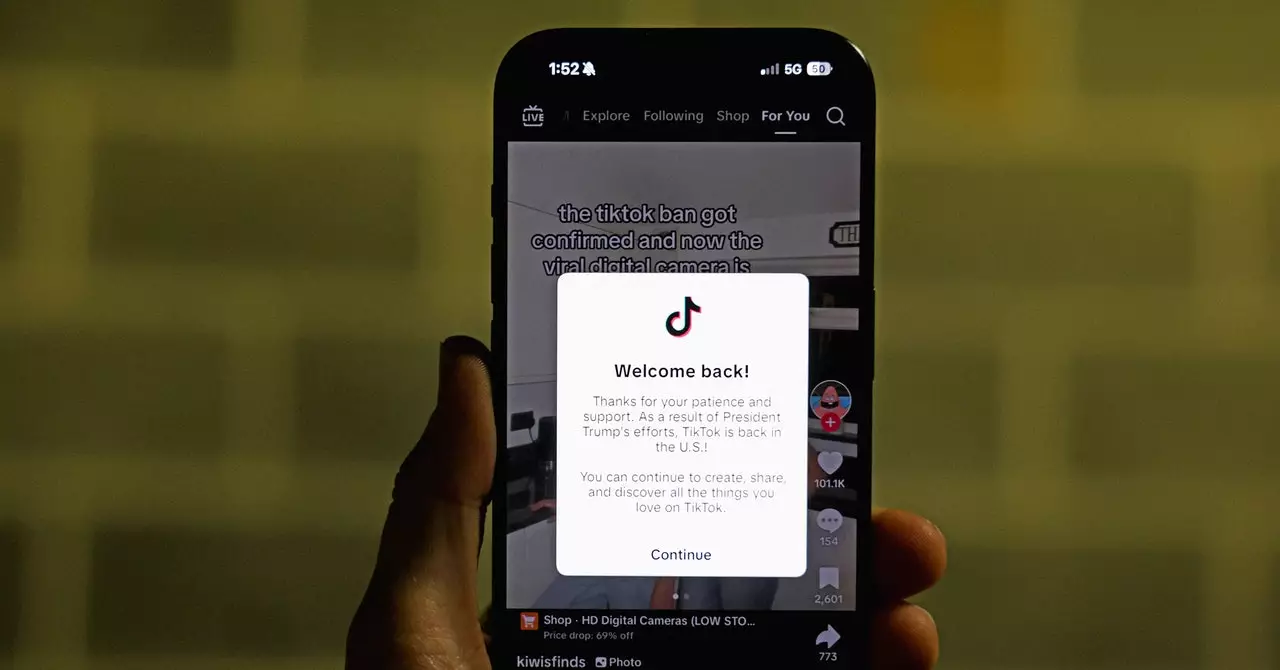TikTok’s rollercoaster ride in the U.S. continues to captivate users, tech analysts, and policymakers alike. After a temporary yet consequential absence from major app platforms, the Chinese-owned social media application is back on iOS and Google Play stores. This return, occurring twenty-six days post-removal, highlights the interplay between technology, foreign relations, and legislative actions in an increasingly polarized digital landscape.
On January 19, TikTok abruptly vanished from the U.S. app marketplaces, leaving millions of users unable to access their favorite video-sharing platform. This ban stemmed from provisions within the Protecting Americans From Foreign Adversary Controlled Applications Act (PAFACA). The underlying concern was that TikTok, owned by ByteDance, posed a potential security risk, invoking fears related to data privacy and national security. Users searching for TikTok in app stores were met with disheartening notifications, effectively severing a vital connection to their online communities, while pushing some to competitor applications.
The situation escalated quickly, with a sense of urgency palpable both among users and TikTok executives. Just hours before the ban took effect, TikTok’s leadership garnered assurances from president-elect Donald Trump, who indicated that he would provide additional time for a more favorable resolution. This moment marked the beginning of a complicated negotiation phase—one characterized not only by political maneuvering but also by the profound implications for American consumers and the tech industry.
Administrative Maneuvering and the Importance of Assurance
Once Trump assumed the presidency on January 20, his administration took a different approach. An executive order offered a temporary stay on enforcement, allowing a window of 75 days for potential negotiations regarding the app’s future. However, despite this apparent breathing room, the major app stores remained cautious, initially refraining from reinstating TikTok and other apps from ByteDance. Throughout this period, the uncertainty cast a shadow over TikTok users, stoking concerns about the app’s sustainability and future availability.
Attorney General Pam Bondi’s recent assurance to tech giants—guaranteeing that they would not face penalties for hosting TikTok—ultimately facilitated the return of the app to app stores. This reinstatement underlines a significant response to the potential legal consequences faced by American companies and reflects the ongoing tensions in U.S.-China relations. The intricate dance between government assurances and corporate decisions raises questions about accountability in the tech sector and the influence of foreign entities on American digital platforms.
During TikTok’s absence, alternative platforms benefited from a surge in user adoption. Applications not encumbered by the same legislative scrutiny saw increased traffic, indicative of the fragility inherent in the digital platform space. With TikTok temporarily shelved, users explored other avenues, a process that not only sparked competition amongst digital services but also illustrated the app’s role as a digital staple in the social media landscape.
This catalyst for movement among users demonstrates how intertwined society is with their digital tools, revealing the power and importance of apps like TikTok. As the ban lifted and TikTok returned, competing apps that had gained traction now face an uphill battle—that of retaining users who may have found new digital homes.
Future Regulations and Negotiations
The future remains uncertain for TikTok as it navigates both usage and legal frameworks. Provisions under PAFACA allow for a potential extension of the ban, should significant negotiations regarding a sale to a non-Chinese entity not progress. Reports indicate that discussions involving Oracle and investment partners could be on the horizon, with implications not only for TikTok’s operations but also for the broader tech landscape in America.
As the astute eye of the government continues to scrutinize foreign-held applications, a delicate balance of user interests, data privacy, and international relations remains pivotal. The dance between digital innovation and national security will likely shape the discourse around social media in the years to come, as users, stakeholders, and policymakers grapple with ever-evolving technological challenges.

